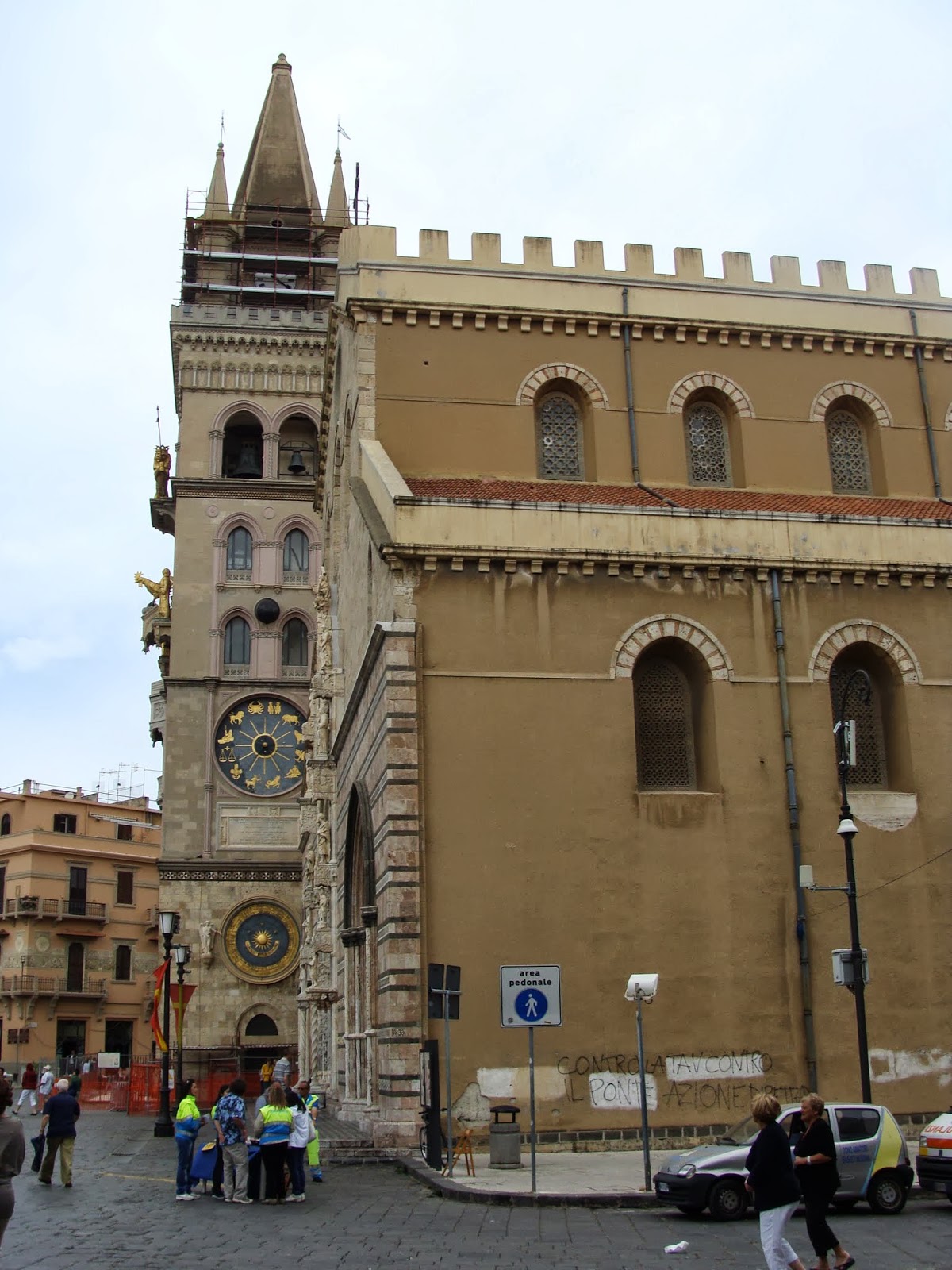Travel - May
21 – Tuesday – Cursing the Strait of Messina and Messina Italy
The Strait of Messina (Stretto
di Messina in Italian language, Strittu di Missina in Sicilian) is the narrow passage between the eastern
tip of Sicily and the southern tip of Calabria in the south of Italy. It connects the Tyrrhenian Sea with theIonian Sea, within the central Mediterranean. At its narrowest point, it measures
3.1 km (1.9 mi) in width, though near the town of Messina the width is some 5.1 km
(3.2 mi) and maximum depth is 250 m (830 ft).
A ferry service connects Messina on Sicily
with the mainland at Villa San Giovanni, which lies several
kilometers north of the large city of Reggio Calabria; the ferries hold the cars (carriages) of
the mainline train service between Palermo and Naples. There is also a hydrofoil service between Messina and Reggio
Calabria.
The strait is characterized by strong tidal
currents, that established a unique
marine ecosystem. A
natural whirlpool in the Northern
portion of the strait has been linked to the Greek legend of Scylla and Charybdis. This Greek myth is worth looking up when you have a moment. It is about a nymph that is cursed and lives in the straits attacking ships as they pass. In some circumstances, the mirage of Fata Morgana can be observed when
looking at Sicily from Calabria.
In 1957, a 220-kV overhead powerline was built across the
Strait of Messina. Its pylons are among the highest in the world. This powerline
has since been replaced by a submarine power cable, but the pylons remain and
are protected as historical monuments.
Before getting off the ship around 11 AM, we spent a leisurely
morning looking at the busy port activities and doing a bit of research on the
MSC Preziosa, a new, huge cruise ship
parked next to us. Google indicates that
the ship was originally ordered by one of Gaddafi’s sons. But when the Gaddafi tribe fell onto hard
times, MSC purchased the ship ($700 million plus, 3,500 passengers, maiden
voyage Mar 24 of this year) and directed its final stages of construction. Needless to say, the MSC website makes no
reference to the Gaddafi connection. The
Nieuw Amsterdam is certainly no rowboat, but the MSC ship seemed to tower over
us.
Once off the ship, we walked around the port and part of the old
town. Sicily lives up to its billing as
a somewhat neglected part of Italy, but apparently the feeling of separation is
not a burden for Sicilians, who are more than proud of their own identity and
distance from the rest of Italy.


We
happened to enjoy a small café for refreshments and a crack at a real Italian
cannoli. After pausing for a
moment, the
owner indicated – with visible disdain - that he did not have any ricotta
(mainland Italy) cheese for cannolis, but he did have a far better dessert made
of puff pastry filled with pistachio cream.
And it was absolutely superb!
Messina (pron.: /məˈsiːnə/; Italian
pronunciation: [mesˈsiːna] ( listen), Sicilian: Missina; Latin: Messana) is the capital of the
Italian province of Messina and the third largest
city on the island of Sicily, with a population of more
240,000 inhabitants in the city proper and about 650,000 in the province. It is
located near the northeast corner of Sicily, at the Strait of Messina, opposite Villa San Giovanni on the mainland.
listen), Sicilian: Missina; Latin: Messana) is the capital of the
Italian province of Messina and the third largest
city on the island of Sicily, with a population of more
240,000 inhabitants in the city proper and about 650,000 in the province. It is
located near the northeast corner of Sicily, at the Strait of Messina, opposite Villa San Giovanni on the mainland.
The
city's main resources are its seaports (commercial and military shipyards), and
agriculture (wine production and cultivating lemons, orange, mandarin oranges
and olives). The city has been a Roman Catholic Archdiocese and Archimandrite seat since 1548 and
is home to a locally important international fair.
We departed Messina around 6 PM, cleared the Strait of Messina to the south, and then turned east to start crossing the Ionian Sea. We’re looking forward to tomorrow and a day at sea to rest tired feet! Next stop is Katakolon, Greece. Good night from the Nieuw Amsterdam and Artfully Ann's Adventures.






No comments:
Post a Comment
Thanks for visiting Artfully Ann's Adventures